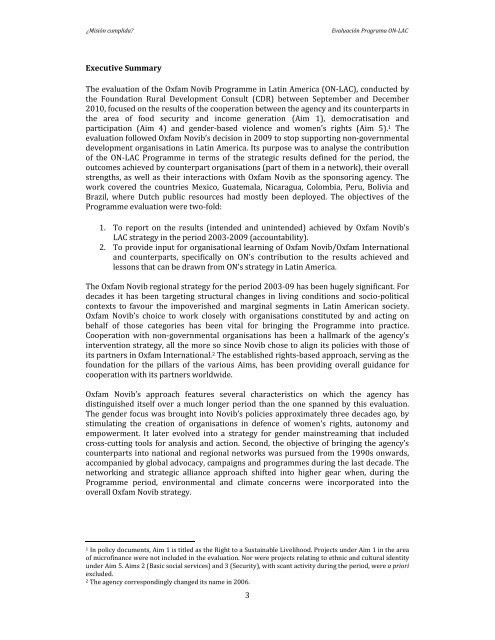¿MISION CUMPLIDA? EVALUACIÓN DEL PROGRAMA DE ... - Novib
¿MISION CUMPLIDA? EVALUACIÓN DEL PROGRAMA DE ... - Novib
¿MISION CUMPLIDA? EVALUACIÓN DEL PROGRAMA DE ... - Novib
You also want an ePaper? Increase the reach of your titles
YUMPU automatically turns print PDFs into web optimized ePapers that Google loves.
¿Misión cumplida? Evaluación Programa ON-LAC<br />
Executive Summary<br />
The evaluation of the Oxfam <strong>Novib</strong> Programme in Latin America (ON-LAC), conducted by<br />
the Foundation Rural Development Consult (CDR) between September and December<br />
2010, focused on the results of the cooperation between the agency and its counterparts in<br />
the area of food security and income generation (Aim 1), democratisation and<br />
participation (Aim 4) and gender-based violence and women’s rights (Aim 5). 1 The<br />
evaluation followed Oxfam <strong>Novib</strong>’s decision in 2009 to stop supporting non-governmental<br />
development organisations in Latin America. Its purpose was to analyse the contribution<br />
of the ON-LAC Programme in terms of the strategic results defined for the period, the<br />
outcomes achieved by counterpart organisations (part of them in a network), their overall<br />
strengths, as well as their interactions with Oxfam <strong>Novib</strong> as the sponsoring agency. The<br />
work covered the countries Mexico, Guatemala, Nicaragua, Colombia, Peru, Bolivia and<br />
Brazil, where Dutch public resources had mostly been deployed. The objectives of the<br />
Programme evaluation were two-fold:<br />
1. To report on the results (intended and unintended) achieved by Oxfam <strong>Novib</strong>’s<br />
LAC strategy in the period 2003-2009 (accountability).<br />
2. To provide input for organisational learning of Oxfam <strong>Novib</strong>/Oxfam International<br />
and counterparts, specifically on ON’s contribution to the results achieved and<br />
lessons that can be drawn from ON’s strategy in Latin America.<br />
The Oxfam <strong>Novib</strong> regional strategy for the period 2003-09 has been hugely significant. For<br />
decades it has been targeting structural changes in living conditions and socio-political<br />
contexts to favour the impoverished and marginal segments in Latin American society.<br />
Oxfam <strong>Novib</strong>’s choice to work closely with organisations constituted by and acting on<br />
behalf of those categories has been vital for bringing the Programme into practice.<br />
Cooperation with non-governmental organisations has been a hallmark of the agency’s<br />
intervention strategy, all the more so since <strong>Novib</strong> chose to align its policies with those of<br />
its partners in Oxfam International. 2 The established rights-based approach, serving as the<br />
foundation for the pillars of the various Aims, has been providing overall guidance for<br />
cooperation with its partners worldwide.<br />
Oxfam <strong>Novib</strong>’s approach features several characteristics on which the agency has<br />
distinguished itself over a much longer period than the one spanned by this evaluation.<br />
The gender focus was brought into <strong>Novib</strong>’s policies approximately three decades ago, by<br />
stimulating the creation of organisations in defence of women’s rights, autonomy and<br />
empowerment. It later evolved into a strategy for gender mainstreaming that included<br />
cross-cutting tools for analysis and action. Second, the objective of bringing the agency’s<br />
counterparts into national and regional networks was pursued from the 1990s onwards,<br />
accompanied by global advocacy, campaigns and programmes during the last decade. The<br />
networking and strategic alliance approach shifted into higher gear when, during the<br />
Programme period, environmental and climate concerns were incorporated into the<br />
overall Oxfam <strong>Novib</strong> strategy.<br />
1 In policy documents, Aim 1 is titled as the Right to a Sustainable Livelihood. Projects under Aim 1 in the area<br />
of microfinance were not included in the evaluation. Nor were projects relating to ethnic and cultural identity<br />
under Aim 5. Aims 2 (Basic social services) and 3 (Security), with scant activity during the period, were a priori<br />
excluded.<br />
2 The agency correspondingly changed its name in 2006.<br />
3



